Embracing Ecotourism and Sustainable Tourism: A Path Forward in Hospitality Development
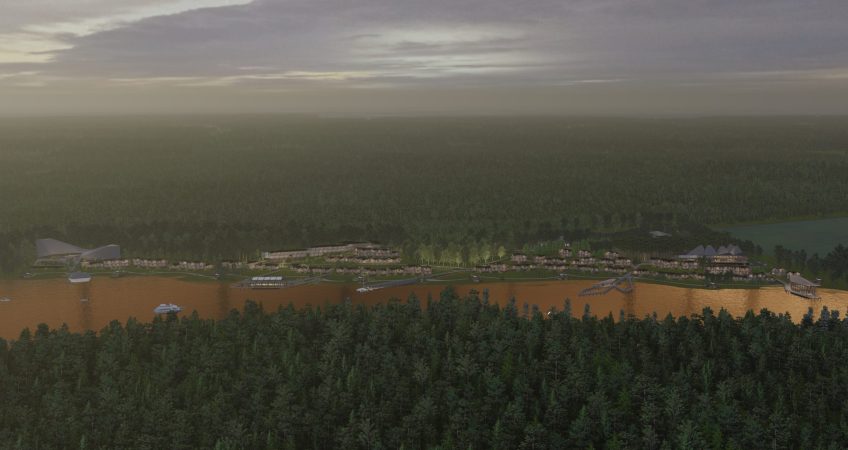
As the global tourism industry continues to evolve, the concepts of ecotourism and sustainable tourism have become pivotal in shaping the future of hospitality development. These concepts represent a shift towards responsible travel that prioritizes environmental conservation, cultural preservation, and long-term viability.
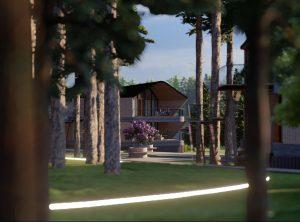 Ecotourism specifically focuses on responsible travel to natural areas, aiming to conserve the environment and improve the well-being of local communities. It involves small-scale tourism activities that educate visitors about nature and culture, promoting a deeper understanding and appreciation of these elements. The core idea is to minimize the environmental impact while maximizing the positive influence on local ecosystems and economies.
Ecotourism specifically focuses on responsible travel to natural areas, aiming to conserve the environment and improve the well-being of local communities. It involves small-scale tourism activities that educate visitors about nature and culture, promoting a deeper understanding and appreciation of these elements. The core idea is to minimize the environmental impact while maximizing the positive influence on local ecosystems and economies.
Sustainable tourism, while encompassing the principles of ecotourism, extends further. It is a broader concept that applies to all forms of tourism. Sustainable tourism seeks to balance the needs of tourists, the environment, and host communities, ensuring that tourism activities are economically viable, environmentally responsible, and culturally sensitive. It integrates the principles of sustainable development into the tourism industry, aiming to reduce the carbon footprint, preserve cultural heritage, and promote social equity.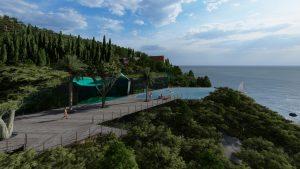
For developers and investors in the hospitality industry, aligning with these trends is not just an ethical choice but a strategic one. Properties designed with sustainability in mind are increasingly valued by a market that is becoming more environmentally conscious. Integrating renewable energy sources, utilizing eco-friendly construction materials, and ensuring that developments blend seamlessly with their natural surroundings are no longer optional but necessary components of modern hospitality projects.
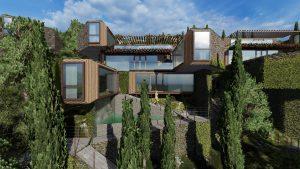 A prime example of these principles in action can be seen in recent projects such as the luxury resort developments along the Black Sea coast and the pristine retreat in Karelia, developed by JTA Architecture. These projects are carefully crafted to harmonize with their natural surroundings, employing sustainable building techniques such as CLT panels for modular construction and integrating natural landscapes into the resorts’ layouts.
A prime example of these principles in action can be seen in recent projects such as the luxury resort developments along the Black Sea coast and the pristine retreat in Karelia, developed by JTA Architecture. These projects are carefully crafted to harmonize with their natural surroundings, employing sustainable building techniques such as CLT panels for modular construction and integrating natural landscapes into the resorts’ layouts.
Additionally, JTA Architecture emphasizes energy efficiency through strategic building orientation to maximize natural light and ventilation, reducing reliance on artificial systems. The use of local, sustainable materials not only minimizes the environmental footprint but also enhances the aesthetic integration of the structures with their surroundings. Each project is thoughtfully designed to preserve local biodiversity, incorporating green spaces and ecological corridors that encourage wildlife habitation. These resorts also feature low-impact recreational areas that blend seamlessly with the natural terrain, offering guests immersive experiences without disturbing delicate ecosystems.
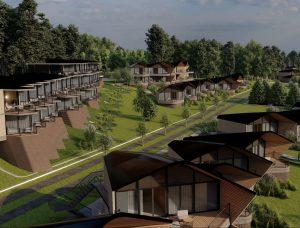 This holistic approach reflects JTA Architecture‘s commitment to creating spaces that are not only luxurious and visually stunning but also environmentally responsible and sustainable, setting new standards in the hospitality industry. By prioritizing the preservation of natural landscapes and local ecosystems, JTA Architecture ensures that each project not only coexists with but also enhances its environment. Their designs incorporate renewable energy solutions, such as solar and geothermal systems, and emphasize water conservation through innovative rainwater harvesting and greywater recycling. Furthermore, the integration of locally sourced materials supports regional economies and reduces transportation emissions, further underlining the firm’s dedication to sustainability.
This holistic approach reflects JTA Architecture‘s commitment to creating spaces that are not only luxurious and visually stunning but also environmentally responsible and sustainable, setting new standards in the hospitality industry. By prioritizing the preservation of natural landscapes and local ecosystems, JTA Architecture ensures that each project not only coexists with but also enhances its environment. Their designs incorporate renewable energy solutions, such as solar and geothermal systems, and emphasize water conservation through innovative rainwater harvesting and greywater recycling. Furthermore, the integration of locally sourced materials supports regional economies and reduces transportation emissions, further underlining the firm’s dedication to sustainability.
JTA Architecture‘s projects also promote community engagement, offering educational programs on environmental stewardship and sustainable living, thereby fostering a deeper connection between guests and the local culture and environment. These initiatives collectively ensure that their developments leave a positive, lasting impact on both the natural world and the communities they serve..
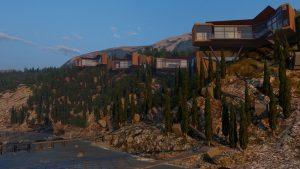 Investing in sustainable and eco-friendly tourism infrastructure is about creating long-term value. It appeals to a growing segment of tourists who prioritize sustainability, and it ensures that the natural and cultural assets that attract visitors are preserved for future generations. As the industry moves forward, embracing these trends will not only enhance the appeal of new developments but also ensure their resilience and success in an increasingly competitive market.
Investing in sustainable and eco-friendly tourism infrastructure is about creating long-term value. It appeals to a growing segment of tourists who prioritize sustainability, and it ensures that the natural and cultural assets that attract visitors are preserved for future generations. As the industry moves forward, embracing these trends will not only enhance the appeal of new developments but also ensure their resilience and success in an increasingly competitive market.
